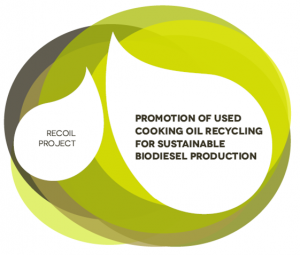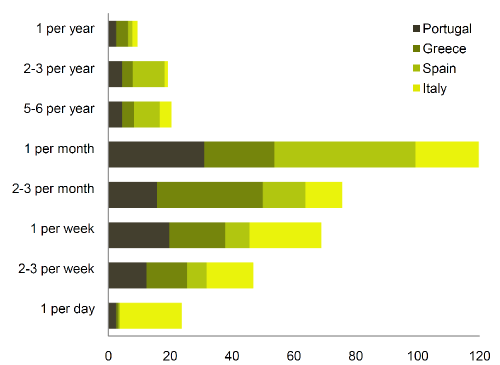 Used cooking oil (UCO) is a problematic waste to get rid of. Its inadequate disposal can result in harmful environmental effects: it hinders sewage treatment, it is highly toxic for natural ecosystems and at domestic level, it can block pipes and cause odors.One interesting option for UCO management is its energy valorization. Through a simple chemical process UCO can be converted into biodiesel, an alternative fuel similar to diesel but with several advantages: it is a much better lubricant than diesel, extending the engine’s life, it’s highly biodegradable and it provides significant reductions in CO2 emissions. Biodiesel produced from UCO is also avoiding possible impacts of biofuels production on agricultural food products (helping to fulfill the sustainability criteria for biofuels set in the Renewable Energy Directive) and preventing UCO deposition in landfills. Moreover, it has the lowest greenhouse gas emissions amongst biofuels, enabling larger emission savings in comparison with petroleum derivate fuels. Thus, the recycling of UCO can contribute to achieve the target set forward by the EU to reduce its CO2 emissions by 20% by 2020.
Used cooking oil (UCO) is a problematic waste to get rid of. Its inadequate disposal can result in harmful environmental effects: it hinders sewage treatment, it is highly toxic for natural ecosystems and at domestic level, it can block pipes and cause odors.One interesting option for UCO management is its energy valorization. Through a simple chemical process UCO can be converted into biodiesel, an alternative fuel similar to diesel but with several advantages: it is a much better lubricant than diesel, extending the engine’s life, it’s highly biodegradable and it provides significant reductions in CO2 emissions. Biodiesel produced from UCO is also avoiding possible impacts of biofuels production on agricultural food products (helping to fulfill the sustainability criteria for biofuels set in the Renewable Energy Directive) and preventing UCO deposition in landfills. Moreover, it has the lowest greenhouse gas emissions amongst biofuels, enabling larger emission savings in comparison with petroleum derivate fuels. Thus, the recycling of UCO can contribute to achieve the target set forward by the EU to reduce its CO2 emissions by 20% by 2020.
Last March a round table titled Used Cooking Oil to Biodiesel Chain towards 2030 – Turning Waste into Resource was organized in Brussels by the European Biomass Industry Association. This event was organized with support of the EU project RecOil, cofunded by the Intelligent Energy for Europe Programme. Representatives of EU institutions, NGOs, industries and media, discussed the current barriers and the opportunities for the market of the Used Cooking Oil based biodiesel.
Despite its collection and transport costs, UCO is a relatively cheap feedstock. In addition its transformation process is not considered as technologically advanced nor very expensive. For these reasons, the last ILUC Directive version approved by the European Parliament (February 2015), doesn’t include UCO based biodiesel in the advanced biofuels list while UCO is eligible for double counting towards the 10% decarbonization goal by 2020. UCO should be supported for its high GHG emissions saving power, in accordance with the Fuel Quality Directive. Cutting subventions to first generation biofuels will represent the main support to the waste based ones after 2020. The EC has been very interested in the UCO to biodiesel chain development along the past years. In fact it has co-funded several projects centred on this topic (e.g. CIVITAS project). Some of these projects are recognized as best practices on EU level and demonstrate that the local production of UCO based biodiesel is a sustainable, feasible and profitable solution for the public transport sector. Furthermore the coordination centre of policies and initiatives supporting the biofuels market is more and more shifting from the EU to the national level. As a consequence, national and local authorities will play a key role in the development of suitable regulations enhancing the UCO management, eliminating the existing contrasts with the Animal by Product regulation. The 3rd article of the Alternative Fuels Directive gives an important role to advanced biofuels, basing the development of national targets and objectives on reliable and updated information, analysis and projections for the future. The national authorities of the EU28 MS would play a major role in distributing the incentives for advanced biofuel in a way that is convenient for the environment and for the local economies.
Voluntary certification schemes adapted to waste based biofuels have been able to tackle UCO thefts and fraud risks. At present, one the main obstacle to overcome is the scarce awareness of the UCO environmental, economic and social impacts. Unfortunately the greatest part of EU citizens and policy makers is not yet aware of the relevant benefits of the UCO to biodiesel chain implementation due to scarce visibility and poor presence in the public debate. In this sense, supporting UCO requires a big promotion and raising awareness effort.
Social acceptance and behaviour
Householders’s behaviour is a crucial factor in the used cooking oil collection chain. Thus it is important to identify the most appropriate household UCO collection method in the perspective of the householders that generate used oil, and to identify the psychosocial factors that can function as barriers or facilitators to this collection. RecOil project developed a survey on Greece, Italy, Portugal and Spain and interviewed the cookers of 877 households with the aim to build a behavior profile regarding used oil disposal. Interviewees were mainly women (83,6%) between 38-54 years old (95%). Only a fifth of respondents have a Used Cooking Oil (UCO) Recycling System operating at the place they live. Households use on average 2,5 liters of oil per month. Nearly half of them storages the oil for reuse (58%) and most of these people eliminate residues of the oil (48%). Used Cooking oil is mainly storage on glass or plastic bottles (by 55,7% of people who reuse the oil), with an average capacity of 1,5 liters. People mainly dispose the used oil once a month.

People who have a UCO collection system on their area are more prone to reuse and filter the oil than people who do not have such system and are less willing to dispose oil on sewage. In general People prefer a UCO collection system with disposal facilities on the public space, and are more prone to participate if the system is easy and practical (38,4%). Facilities should be well managed and clean, and a common identity for UCO collection system across the country should be developed. Domestic users demands information about where disposal facilities are located and practical description about how to dispose UCO, as well as information on UCO uses and environmental benefits. Social media such as TV, radio or newspapers are preferred for spreading the messages.
Online guide for UCO collection
One of the main outputs of RecOil is an online guide based on good pratices identified by the project partners. This tool provides guidance on how to implement and optimize your Used Cooking Oil (UCO) to biodiesel chain. In this guide you can find information about UCO collection systems, transformation methods, legal framework and several useful tips related to communication, maintenance, safety, promotional campaigns and operators.
Find the online guide and much more about recycling of UCO here.



